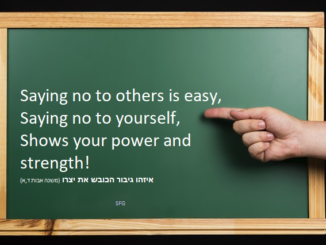
There is the age-old debate over how to raise good, emotionally healthy, and responsible children. The goal of raising children is that they should one day be able to raise their own nest, be God-loving and God-fearing Jews who can continue your family chain by being responsible, caring, loving husbands and parents to their children.
When children are young, life can feel overwhelming. From staying awake many nights to listening to crying and working through tantrums. Parents sometimes feel overwhelmed with the daily activities and forget to focus on the bigger picture and bigger goals.
However, we must remember that when children are young, it is when you start shaping them as to how they will act to their spouse and children. Your future generations depend on your actions now.
We must be filled with love, compassion and at same time firm with children and teach them that there are reward and consequences for actions.
Punishment, Discipline, & Consequence Definition:
Punishment: the infliction or imposition of a penalty as retribution for an offense.
Discipline: the practice of training people to obey rules or a code of behavior, using punishment to correct disobedience.
Consequence: a result or effect of an action or condition, good or bad.
These worlds are often interchanged, however, the goal here is not to inflict pain for previous actions, but to make sure that the child does not repeat this behavior in the future. It is best to use the word consequence, as it is important for us and for children to learn that there are consequences for every one of our actions, sometimes very good and sometimes very bad.
Disciplining a child is not easy. As parents, we love and feel compassion for our children. However, without consequences for negative actions, children turn out to be a nightmare for the parents and to those around them. The most important rule is that consequences must be made very clear before the child does the action.
As a parent, you are the one responsible for them and their behaviors, until they turn 12 years for a girl and 13 years old for a boy. When a child reaches adulthood, Hashem says they themselves are responsible for their own actions and behaviors. The teenage years is the time for them to start the “flying the nest” process “with you as their “training wheels”.
At this age, give positive feedback, encourage, compliment, give age appropriate consequences for breaking household rules which disrupt the family. This is the time to teach responsibility in life, so that they can take responsibility for their families when the time comes.
When a child misbehaves, parents get upset and rightfully so. However, how you react will affect how your child sees themselves, the world and how they behave in the future. You can have a number of reactions to misbehavior, Hitting, Screaming or Discipline.
Hitting. When a child gets slapped, they learn to be more careful not to do that act again, or at least not in front of you. This is out of fear of being smacked and suffering the physical pain. The child also learns that when one gets angry, they respond by lashing out and hitting. They, too, will learn to react this way and likely become a physically abusive spouse and/or parent. Most parents, who hit their children, do so out of anger rather than out of love for the child in order to teach them a lesson. Our rabbis taught (see below) כל הכועס כאילו עובד עבודה זרה someone who is angry it is as if they are worshiping idols at the time. Therefore, when hitting your child out of anger, it will lead to bad for you and your child.
שכתוב במסכת שבת (דף קה עמוד ב) שהמקרע בגדיו בחמתו והמשבר כליו בחמתו והמפזר מעותיו בחמתו יהא בעיניך כעובד עבודה זרה, ולא כתוב שם על מי שסתם כועס שהוא נחשב כאילו עובד עבודה זרה, אולם זה כתוב בזוהר הקדוש (בראשית דף כז עמוד ב) שכל הכועס כאילו עובד עבודה זרה, וכן כתב הרמב”ם (הלכות דעות פרק ב הלכה ג) אמרו חכמים הראשונים כל הכועס כאילו עובד עבודת כוכבים.
Screaming, many parents, who would never lay their hands on their child, scream at the child instead. Many times becoming verbally abusive to get the child to behave. Parents sometime don’t realize how terribly painful the words used while screaming are. Putting down your spouse or child causes emotional damage that cuts into their self-confidence and is, oftentimes, much worse than the physical pain of slapping.
Discipline, is done to train our children to follow rules and behaviors. The reason behind discipline and consequences are not as so much to punish for the previous actions, but more to teach good behavior for the future.
Discipline can be done at the time of the child’s negative actions or, if you are too angry to act at that time, do so at a later that day or the next. Calmly sit down with the child to discuss the negative action, and let them know that they will now suffer the consequences for that action.
The Torah משלי פרק כב ו (Mishli 22,6) tells us חנך לנער על פי דרכו the importance of raising and disciplining children, each according to their age, stage, and nature. There is no one size fits all method for raising children.
Consequences that fit the action means that the child will feel uncomfortable and learn not to repeat that behavior or actions. Example, if a child above 5 years old is disrespectful to his parent, remove the child from the public space. Timeout, send the child into a room so they have time to calm down and think about what they have done. Tell the child that they have to be in the room and that they can come out as soon as they are ready to apologize to the parent.
When it comes to younger children, just put them in timeout on a chair in the room where you are. Despite telling them before that this action will result in timeout, make it very clear what they did to deserve the timeout. When children don’t know clearly why they are punished, it is useless, and they get resentful (rightfully so).
One minute for every year of their age. A 3-year-old sits 3 minutes. When the time is over, make sure to ask them what they did to have been placed in timeout. If they don’t respond, make them sit down again. Tell them that once they tell you what they did wrong, they can come off. (if you think that the child did not understand what they did, tell them, again, sit them down again, and ask them to repeat it to you. )
If a child is stubborn and refuses to talk or cooperate, don’t get angry, don’t engage much. Let them sit there, smile at them occasionally, say something nice about them so that they know that these consequences are done out of love and caring for them.
When siblings fight:
Although, many people feel that it is OK and normal for sibling to fight, (girls often resort to saying harsh words and boys do so more physically) it seems that there is no greater heartache for parents than seeing their own flesh and blood rip each other apart. It is our duty to teach children appropriate communication skills and behaviors between siblings. These lessons will then translate to their successes and to healthy communication in all their other relationships’ marriage, work, etc.
I found it very interesting that when two children fight, instead of getting involved as judge and jury to decide who started and who is guilty, just send both kids into the room. At first, I thought this was a terrible idea, as the two children will be able to continue fighting without oversight. However, I found that when children were sent into a room together, they team up to be against the punishment, and they start playing nicely together. After doing so several times, children learn to how to navigate and build their relationship together.
When consequences are done with compassion and out of concern to teach the child to behave better in the future, even if the child feels that you are harsh, they will learn from it and will not usually be resentful.
Children thrive on stability. Once the child learns and understands how the world works with its systems that every action has a reaction in the form of good or bad consequences, they feel safe, secure and in control of life. At times, you may feel too tired or exhausted to discipline your child. However, remember that there is no greater pleasure for a parent than having well-adjusted, well-behaved children.


